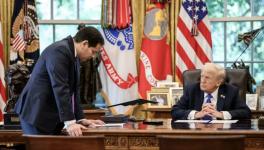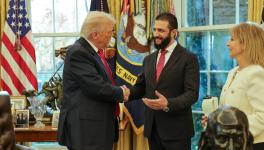A Year Later: How the January 6 Capitol Riots Changed, or Didn't Change, the US
The 'QAnon Shaman' became a symbol of the storming of the Capitol
For over two centuries, the congressional certification of votes in a US presidential election was normally a procedural rubber stamp. But on January 6, 2021, it became a moment of reckoning, a wake-up call, an event that for many observers seemed to rattle the foundation of America's democracy.
As US lawmakers met to certify Joe Biden's victory, then-President Donald Trump addressed a crowd that for weeks had been fed the "big lie" by right-wing media, online conspiracy theory movements like QAnon and neo-fascist groups like the Proud Boys, which claim Biden stole the 2020 US presidential election.
In an effort to "stop the steal," the crowd of Trump loyalists wreaked havoc in the Capitol and attempted to stop the certification of Biden's victory.
The riot in Washington, DC, left four Trump protesters and one Capitol police officer dead and 140 officers injured. A rare, unified response of condemnation came from both sides of the US political spectrum.
"There may well have been a sense that, 'OK, this is beyond the pale, this has gone too far. Trump has gone too far,'" said Suzanne Spaulding, director of the Defending Democratic Institutions project at the Center for Strategic and International Studies, speaking of the tenor among Republicans in Congress after the attack.
Capitol Police Officer Brian Sicknick died in the riot
Republicans' fear of Trump's long shadow
By the time Trump was impeached for — and later acquitted of — inciting a riot, however, the unified outcry against the "big lie" split along party lines.
"I think what [Republicans] saw in the weeks and months that followed is that [Trump] did continue to have control over the Republican Party," Spaulding said, adding that the former president also threatened Republican politicians who distanced themselves from him.
Trump gave what many felt was an inflammatory address at the rally on January 6, 2021
Trump and many in his inner circle are still under investigation for having roles in the insurrection. But in the court of public opinion, with a great deal of misinformation and lies on both social and mainstream media, the former president's actions appear legitimate to many.
Nearly half of Republican voters believe that the riots were legitimate protests, according to a June 2021 Monmouth University Poll.
Many of the people who came from across the country to attend that Trump rally believed the lies and conspiracies about a stolen election. Some of them faced the legal consequences of their actions, and others await trial.
Jacob Chansley, also known as the 'QAnon Shaman,' was sentenced to 41 months in prison
The road to justice
The FBI has charged 727 people using evidence provided by surveillance cameras, YouTube videos and cell phone footage. Charges against them include obstruction of an official proceeding, use of a dangerous weapon and assault.
Of those convicted, some received negligible fines of $500 (€440) for destruction of property; others will serve prison sentences of over five years for assaulting a police officer.
Communication breakdown
Polarized and divided, people are increasingly looking at the role of social and mainstream media in the United States and how facts are debated and distorted.
"People are getting fed more and more extreme versions of what they may have already consumed" due to social media algorithms, said Regina Lawrence, associate dean at the University of Oregon School of Journalism and Communication.
Facebook whistleblower Frances Haugen has criticized the company for spreading divisive content
When it comes to corrosive mainstream media dialogue, Lawrence said she wished political institutions would more aggressively approach the events on January 6, believing that media would follow that cue.
Beyond media, there are simpler forms of communication to help bridge the divide and provide better public consensus on the events that occurred on January 6 and who to hold accountable.
"There is good research to suggest that as hard as it can be to do, really listening as much as we can to people who hold those more extreme beliefs and really understanding the reasons why they believe what they believe can actually be helpful," Lawrence said.
Get the latest reports & analysis with people's perspective on Protests, movements & deep analytical videos, discussions of the current affairs in your Telegram app. Subscribe to NewsClick's Telegram channel & get Real-Time updates on stories, as they get published on our website.



























